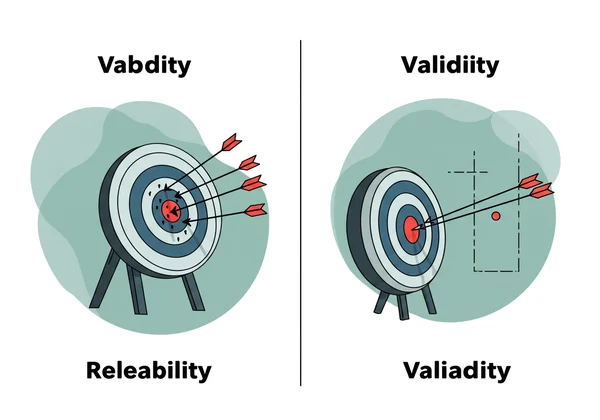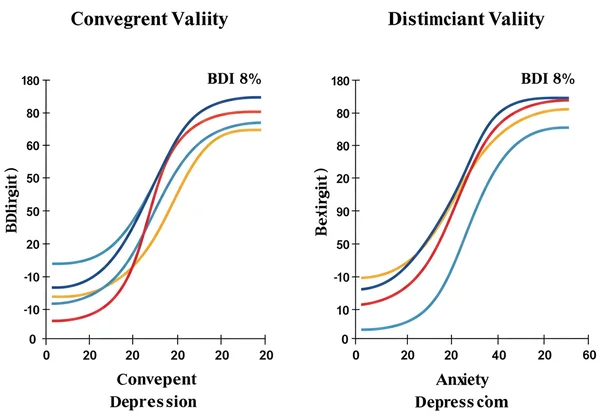Is the BDI Test Accurate? Validity & Reliability Explained
September 2, 2025 | By Beatrice Holloway
When you're seeking clarity about your emotional well-being, the last thing you want is a tool you can't trust. In a world full of online quizzes, it's natural to wonder about the credibility of any assessment, especially one concerning mental health. This leads to a crucial question many people ask: Is the BDI test scientifically valid? The Beck Depression Inventory (BDI) is one of the most widely used instruments for measuring the severity of depression, but its accuracy is paramount for it to be a helpful first step.
The simple answer is yes, the BDI test is a well-established and scientifically respected instrument. However, understanding why it's considered accurate requires a look into its scientific foundation. This article will unpack the concepts of validity and reliability, explore the history behind the BDI, and explain why you can feel confident using it as a starting point for your mental wellness journey. If you're ready to gain insight into your mood, you can take our free BDI test anytime.
Understanding BDI Test Accuracy: What Validity & Reliability Mean
Before we dive into the specifics of the BDI, it's important to understand the two cornerstones of any credible psychological test: validity and reliability. These terms are often used interchangeably, but they measure two distinct qualities that ensure a test is both meaningful and consistent. Think of it like a trusted kitchen scale: reliability means it shows the same weight for the same item every time, while validity means it's actually measuring weight and not something else, like volume.

What is Validity in Psychological Assessment?
In the context of a psychological assessment, validity refers to how well a test measures what it claims to measure. For the BDI, this means it must accurately assess the presence and severity of depressive symptoms. A valid depression test won't be heavily influenced by unrelated feelings like temporary anger or general anxiety. Researchers have established the BDI's validity by comparing its results with clinical diagnoses and other established depression scales, confirming it truly hones in on the key indicators of depression.
The Crucial Role of Reliability for Consistent Results
Reliability, on the other hand, is all about consistency. A reliable test produces stable and consistent results over time and across its questions. If you were to take the BDI today and again in a few days (assuming no significant life events occurred), your scores should be very similar. This is known as test-retest reliability. Furthermore, the BDI has high internal consistency, meaning its 21 questions work together cohesively to measure the same underlying concept—the severity of depression.
The Scientific Basis of the Beck Depression Inventory (BDI)
The BDI didn't just appear out of thin air; it is the product of decades of rigorous scientific research and clinical application. Its strength lies in its development by a leading figure in psychology and its continuous refinement over the years. This strong foundation is a key reason why it remains a gold standard in mental health screening.
Dr. Aaron T. Beck: Pioneer Behind the BDI's Development
The Beck Depression Inventory was created by Dr. Aaron T. Beck in 1961. Dr. Beck is widely regarded as the father of Cognitive Behavioral Therapy (CBT), one of the most effective treatments for depression and anxiety disorders. He developed the BDI based on his clinical observations that people experiencing depression exhibited specific patterns of negative thoughts and beliefs. The test was revolutionary because it was one of the first tools to systematically quantify the severity of these symptoms directly from the patient's perspective.

Evolution of the BDI: From Original to BDI-II and Beyond
Science never stands still, and neither has the BDI. The original inventory has been updated to better align with our evolving understanding of depression. The most significant revision came in 1996 with the release of the BDI-II, which was updated to reflect the diagnostic criteria for depressive disorders outlined in the Diagnostic and Statistical Manual of Mental Disorders (DSM-IV). This update improved the test's ability to assess both cognitive and physical symptoms, ensuring it remains relevant and precise. The version used for the free bdi test online is based on this validated methodology.
Evidence for the BDI's Validity & Reliability
So, what is the actual proof of the BDI's validity & reliability? Decades of research involving thousands of participants have consistently demonstrated that the BDI is a robust and trustworthy tool. It is not just an academic exercise; its value is proven through consistent performance in both research settings and real-world clinical environments.
Consistent Scores: Test-Retest Reliability and Internal Consistency
Studies on the BDI have repeatedly shown high test-retest reliability. This means that individuals' scores remain stable over short periods, confirming that the test is not just capturing fleeting moods but more persistent symptom patterns. Its high internal consistency also shows that all 21 items, from sadness to loss of interest, effectively contribute to a single, coherent score representing depressive severity.
Measuring What Matters: Convergent and Discriminant Validity
Further evidence comes from studies on convergent and discriminant validity. The BDI demonstrates strong convergent validity, as scores on the BDI correlate highly with scores from other respected depression scales. At the same time, it shows good discriminant validity by not correlating too strongly with measures of different psychological issues, like anxiety or psychosis. This confirms the BDI is specifically measuring depression as intended.

Real-World Impact: Clinical Utility and Research Endorsement
Perhaps the most compelling evidence is the BDI's widespread clinical utility. For over 60 years, clinicians, therapists, and doctors around the globe have used it to screen for depression, monitor treatment progress, and inform their clinical judgment. Researchers also rely on the BDI as a primary outcome measure in countless studies, including those testing the effectiveness of new therapies and medications. This enduring endorsement from the professional community underscores its real-world value and accuracy.
Important Considerations: BDI as a Screening Tool, Not a Diagnosis
While the BDI is a scientifically validated tool, it is crucial to understand its role and its limitations. A high score on the BDI is a strong indicator that you should speak with a professional, but the test itself is not a diagnosis. Using the BDI as a screening tool is the first step in a larger process of understanding your mental health.
Why Professional Diagnosis Remains Essential
A professional diagnosis from a qualified healthcare provider is essential for several reasons. A clinician can consider the full context of your situation, including your medical history, life circumstances, and any co-occurring conditions that a self-assessment might miss. They are trained to differentiate between various mental health conditions and can develop a personalized treatment plan. Your BDI score is valuable information to share with a doctor or therapist to start that conversation.
Factors That Can Influence BDI Test Results
Several factors can influence BDI test results. Your score can be affected by your current stress levels, physical illness, lack of sleep, or even how honestly you answer the questions. It's important to reflect on your feelings over the past week, as the test directs, rather than just how you feel in a single moment. Understanding these nuances helps you see your results as a snapshot in time, providing a valuable clue rather than a final verdict. Ready to see your snapshot? Start your self-assessment.

Trusting the BDI Test: A Valid First Step in Your Mental Wellness Journey
The Beck Depression Inventory (BDI) stands as far more than just another online quiz. It is a scientifically rigorous, reliable, and valid screening tool backed by over half a century of research and clinical use. Its accuracy has been consistently proven, making it one of the most trusted instruments for measuring the severity of depressive symptoms.
While it is not a substitute for a professional diagnosis, taking the BDI can be an empowering and insightful first step. It provides a private, confidential way to check in with yourself and gain a clearer understanding of your emotional state. If you’ve been feeling off, let this validated tool help you make sense of your experience. Take a confidential BDI test today to gain valuable insight into your well-being.
Frequently Asked Questions About BDI Test Accuracy
Is the BDI test scientifically valid for self-assessment?
Yes, the BDI is considered scientifically valid and reliable for self-assessment as a screening tool. Its structure allows individuals to accurately report their own symptoms. However, it's designed to measure symptom severity, not to diagnose a condition. The results are a valuable starting point for self-reflection and discussion with a healthcare professional.
How is the BDI different from the BDI-II?
The BDI-II is a revised version of the original BDI, updated in 1996. The changes were made to better align the test questions with the diagnostic criteria for depression in the DSM-IV. The BDI-II includes changes to questions about symptoms like sleep patterns and appetite and has a longer timeframe for symptom recall (two weeks instead of one), making it a more current and comprehensive measure.
Can I use my BDI score alone for a medical diagnosis?
No, you cannot. The BDI is a screening instrument, not a diagnostic tool. A formal diagnosis of depression can only be made by a qualified mental health professional or doctor who can assess your full clinical picture. Your BDI score is an excellent piece of information to bring to that appointment to facilitate a productive conversation.
Does BDI test accuracy vary by language or cultural background?
This is an important consideration. The BDI has been translated into numerous languages and validated in many different cultures. Researchers work to ensure that the translations are culturally appropriate and maintain the test's psychometric properties. Our platform, a leading provider of the free BDI test online, offers the test in over 15 languages, relying on these validated adaptations to serve a global audience accurately.